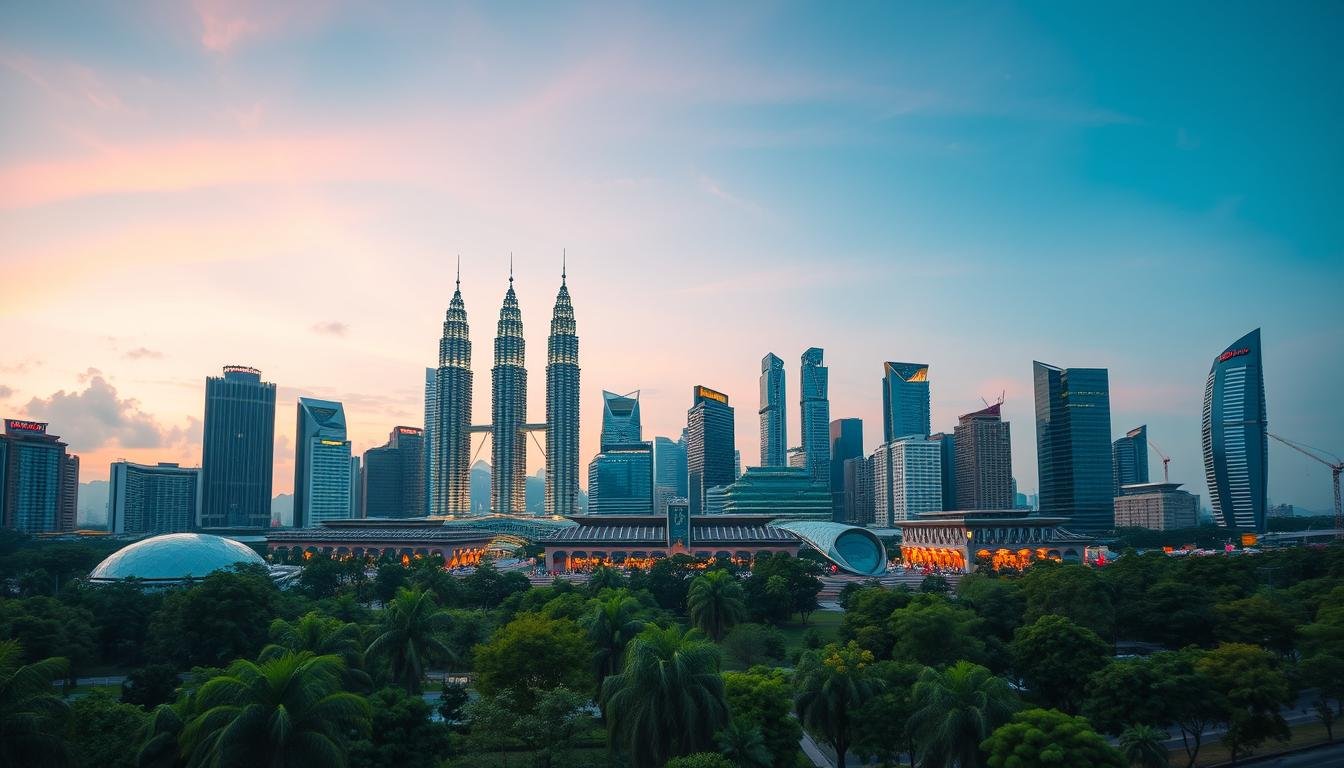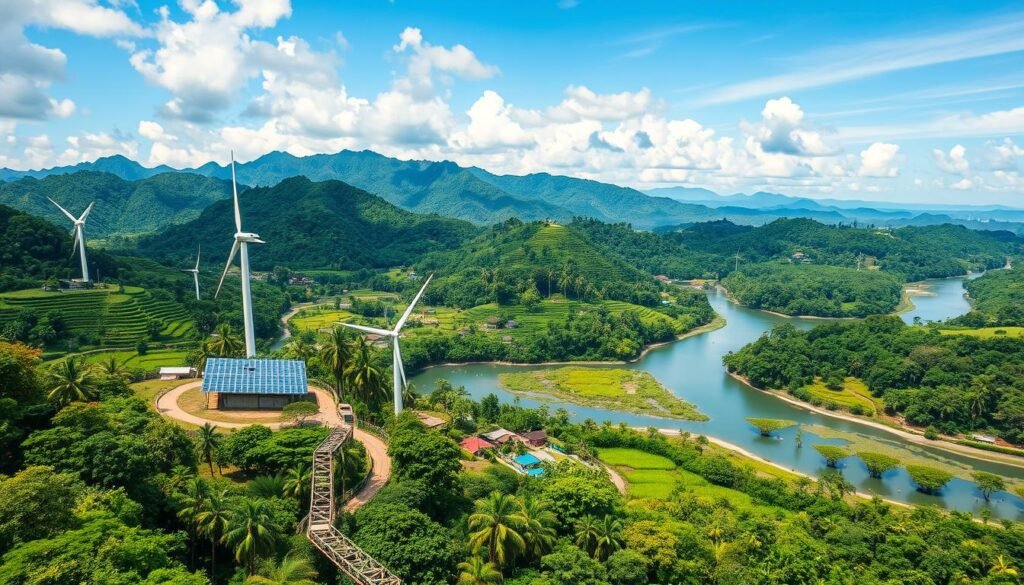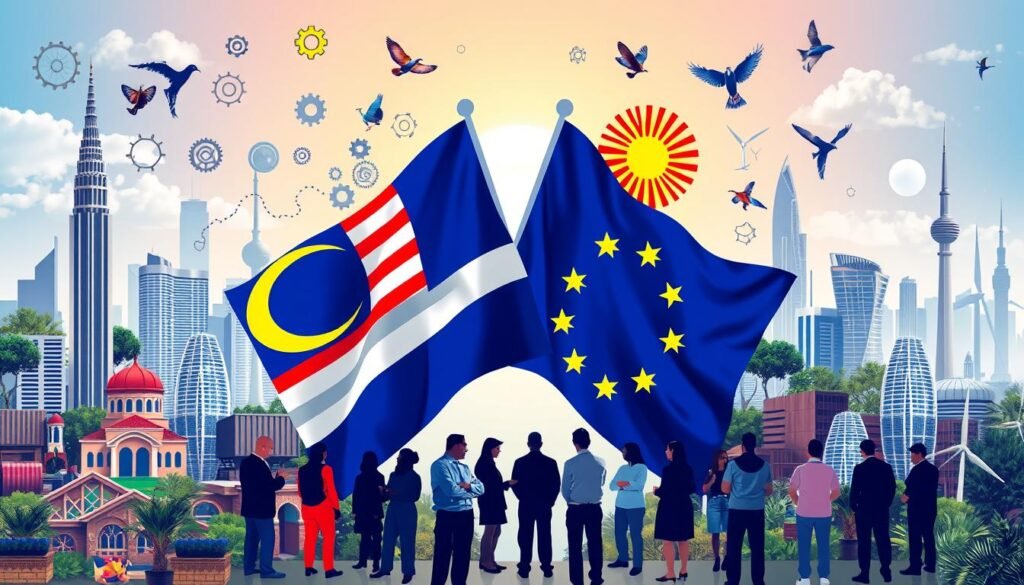
Malaysia: Your Smart Investment Destination in 2025
Malaysia is looking ahead to 2025 with big plans. It aims to be a top spot for smart investments. The country is focusing on economic growth and digital transformation.
The government has a detailed plan to make the digital economy a big part of Malaysia’s GDP. They’re working on the New Industrial Master Plan 2030 and the National Energy Transition Roadmap. These plans are designed to boost innovation and growth.
The government wants to make it easy for investors to come in. They’re building a strong 5G network. This will give investors access to top-notch digital tools.
Key Takeaways
- Malaysia aims to achieve a 25.5% digital economy contribution to its GDP by 2025.
- The government’s New Industrial Master Plan 2030 and National Energy Transition Roadmap are driving innovation and growth across sectors.
- Malaysia is actively developing 5G connectivity infrastructure to support investor expansion and digital transformation.
- The country is positioning itself as a key investment destination in Southeast Asia, offering a range of tax incentives and a business-friendly environment.
- Collaboration with the European Union and the establishment of the Malaysia Economy Digital Corporation are further enhancing Malaysia’s global connectivity and investment opportunities.
Understanding Malaysia's Economic Vision for 2025
Malaysia has set a big goal for 2025. It wants to grow its economy in a sustainable way. The country aims to become more competitive globally. It plans to do this through digital transformation, green projects, and investments in key sectors.
Key Economic Targets and Growth Projections
The government aims for a 6-7% GDP growth rate by 2025. This growth will come from strategic plans. These include digital infrastructure, green tech, and advanced manufacturing.
Digital Economy's 25.5% GDP Contribution Goal
Malaysia wants the digital economy to make up 25.5% of GDP by 2025. This goal will be reached through a digital transformation plan. The plan includes 5G, AI, and cybersecurity investments.
New Industrial Master Plan 2030 Overview
The New Industrial Master Plan 2030 (NIMP 2030) is a roadmap for innovation and growth. It aims to make existing industries more competitive. It also supports new sectors like renewable energy and biotechnology.
| Sector | Key Initiatives | Expected Impact |
|---|---|---|
| Data Center Development |
| Position Malaysia as a regional hub for data centers and digital services |
| SME Development |
| Strengthen the role of SMEs in driving economic growth and diversification |
| Advanced Manufacturing |
| Solidify Malaysia’s position as a leading manufacturing hub in Southeast Asia |
These plans, focusing on sustainability, will shape Malaysia’s future. They will help the country grow and stay competitive.
Smart Cities Initiative: Malaysia's Urban Transformation
Malaysia is working on a big plan to make its cities smart by 2025. The Smart Cities Initiative aims to pick at least five cities for this. These cities will use technology and sustainable practices.
Five Smart City Early Adopters by 2025
The chosen cities will meet high standards set by the Sustainable Cities and Communities-Indicators for Smart Cities (MS ISO 37122:2019). This standard looks at how well cities deliver services, innovate, and attract investments.
- Kuala Lumpur, the vibrant capital, is poised to lead the way as a smart city pioneer.
- Iskandar Malaysia, a dynamic economic corridor, is set to showcase its technological advancements.
- Penang, the renowned “Silicon Valley of the East,” will leverage its digital expertise to become a smart city.
- Cyberjaya, the country’s first intelligent city, is expected to further enhance its smart infrastructure.
- Johor Bahru, a key economic hub, will demonstrate its commitment to sustainable urban development.
Sustainable Cities and Communities Standards
The Sustainable Cities and Communities-Indicators for Smart Cities (MS ISO 37122:2019) is Malaysia’s guide for smart cities. It covers energy use, waste, transport, and digital connections. This ensures a complete approach to city planning.
Urban Development and Climate Change Adaptation
Malaysia is tackling fast urban growth and climate change. The Environmentally-Friendly Drainage Master Plan (PISMA) aims to reduce floods in cities. These steps match the United Nations’ goals for sustainable cities.
“The smart city transformation is not just about technology; it’s about creating livable, sustainable, and inclusive urban environments that empower citizens and attract investment.”
| Event | Date | Attendance | Significance |
|---|---|---|---|
| Smart City Expo Kuala Lumpur 2025 | 2025 | Over 2,000 delegates and 10,000 visitors, with at least 20% from international faculty | Opportunity to showcase Malaysia’s leadership in tech innovation and smart city development |
| Smart City Expo World Congress 2024 | 2024 | Over 25,000 attendees from 850 cities, with 1,146 confirmed exhibitors and 600 speakers | Malaysia to host the event in 2025, becoming the first Southeast Asian country to do so |
Malaysia’s smart cities initiative shows its dedication to sustainable development and climate change adaptation. By using the latest tech and following global standards, Malaysia aims to lead in smart cities.
Investment-Friendly Tax Reforms and Incentives
Malaysia’s 2025 Budget has a total of RM421 billion. It includes tax reforms and incentives to attract more investment. These moves aim to make Malaysia a top investment spot in Southeast Asia.
A 2% Dividend Tax will be applied to dividends over RM100,000 for individual shareholders. This change aims to make the tax system fairer. Also, a Carbon Tax will be introduced in 2026 to support environmental goals.
The government wants to boost “smart logistics” by expanding the Sales Tax and Service Tax (SST). It will also offer tax breaks for these activities. This is to improve Malaysia’s logistics and attract more investments.
A New Investment Incentive Framework will be launched in the third quarter of 2025. It will focus on high-value investments and economic clusters. This is expected to make Malaysia even more attractive for investors.
“Malaysia’s strategic tax reforms and investment incentives demonstrate the government’s commitment to creating a business-friendly environment and driving sustainable economic growth,” said [Expert Name], an economist at [Research Institution].
With these tax reforms and incentives, Malaysia is set to be a smart investment destination in 2025 and beyond. Its digital infrastructure, strategic location, and investment policies all play a role in this.
Why Malaysia is a Smart Investment Destination in 2025
Malaysia is becoming a top choice for investors in Southeast Asia. It has a great location and strong digital setup. The country is working on 5G connectivity, led by Digital Nasional Bhd, to boost business and innovation.
Digital Infrastructure and 5G Connectivity
Malaysia wants its digital economy to make up 25.5% of its GDP by 2025. This puts it at the top of digital change in ASEAN. The government is focusing on digital infrastructure and 5G networks to help businesses use the latest tech.
Strategic Location in Southeast Asia
Malaysia is in the middle of Southeast Asia, making it a great spot for businesses to grow. It has good transport systems, like airports and seaports, for easy movement and delivery across the region.
Investment-Friendly Policies
The Malaysian government is making it easier for investors to come in. The New Investment Incentive Framework will be introduced by the third quarter of 2025. It will offer tax breaks and reforms to draw in both local and foreign investors.
| Incentive | Details |
|---|---|
| Carbon Tax | The proposed Carbon Tax will impact steel, metal, and energy industries starting in 2026. |
| Dividend Tax | A 2% Dividend Tax will be imposed starting in 2025 on dividend income over RM100,000 earned by individual shareholders. |
| Electric Vehicle (EV) Ownership | Tax reliefs for Electric Vehicle (“EVs”) ownership are part of ESG-focused initiatives. |
Malaysia has everything needed for smart investment in 2025 and beyond. It has great digital infrastructure, a strategic location, and policies that welcome investors.
Digital Innovation and Smart Technology Development
Malaysia is pushing hard for digital innovation and smart technology by 2025. It supports tech startups with top-notch incubators. These offer mentorship, cutting-edge research facilities, and shared resources.
The government is serious about growing the digital sector. It’s launching many initiatives to boost innovation and tech. This focus on digital transformation opens big opportunities for businesses in Malaysia.
- Budget 2025 allocates RM10 million for the National Artificial Intelligence Office (NAIO).
- Special tax deductions for training, development, and job creation for high-tech companies under Budget 2025.
- Double tax deductions for AI-related R&D initiatives.
- RM1 billion strategic investment fund to support local talent and encourage high-value activities.
- Simplified processes for hiring foreign graduates in advanced technologies like AI.
- Proposal for the ASEAN AI Safety Network to enhance governance and ethics principles.
| Sector | Investment Opportunities | Key Highlights |
|---|---|---|
| Data Centers and Cloud Computing | Over RM75.87 billion invested in data centers, data hosting, and cloud-computing services projects in Malaysia from 2021 to March 2023. | 440 new jobs are estimated to be generated by the approved investments, with over 80% of these jobs being niche and specialized positions. |
| Smart Farming | Elliance’s Smart Farming platform includes AI-powered precision farming systems, intelligent fertigation and irrigation systems, and AI machine vision for plant health monitoring. | Malaysia secured the 27th spot in the 2023 IMD World Competitiveness Ranking, highlighting its attractiveness for tech investments. |
| Digital Content Hub | Malaysia boasts a robust digital content hub leading to significant revenue, export sales value, and job creation. | The Malaysian digital content market hosts a large number of animation, VFX, games, interactive media, and new media & platforms companies. |
These efforts show Malaysia’s dedication to a thriving digital innovation and smart technology scene. It’s creating great chances for tech startups and big companies to grow in Malaysia’s digital transformation.
“Malaysia is set to become a key hub for digital innovation and smart technology. It’s a great place for businesses to succeed and reach new heights.”
Environmental Sustainability and Carbon Tax Implementation
Malaysia is making big steps towards a greener future. It will start a carbon tax in 2026. This move targets the steel, metal, and energy sectors. It’s part of Malaysia’s plan to become more sustainable and eco-friendly.
Carbon Tax Introduction in 2026
Malaysia will introduce a carbon tax in 2026. This tax will encourage the steel, metal, and energy sectors to be greener. The money from the tax will help fund renewable energy and other green projects.
ESG Initiatives and Green Investment Opportunities
Malaysia is also focusing on ESG and green investments. It offers tax breaks for Electric Vehicle owners. The government also supports green investments with a RM1 billion fund until 2026.
| Green Investment Initiatives | Funding Allocation |
|---|---|
| Electric Motorcycle Use Promotion Scheme | RM100 million |
| Skills Development Fund for Electric Vehicle Sector | RM1 billion |
| Ecological Fiscal Transfer (EFT) Fund | RM250 million |
| Flood Mitigation Projects | RM3 billion |
| National Disaster Management Agency | RM600 million |
| Hazardous Slope Repairs | RM250 million |
These efforts show Malaysia’s dedication to a greener future. It’s working hard to make its economy more eco-friendly.

Smart Logistics and Business Operations
Malaysia is becoming a top spot for smart logistics and advanced business in 2025. It sees the importance of good supply chain management and digital transformation for global success.
To push this goal, Malaysia is offering tax incentives and support. These include:
- A proposed 60% investment tax allowance for investors in Smart Logistics Complexes (SLCs) for 5 years.
- Double tax deductions up to RM2.0 million annually for 3 years for Multinational Enterprises in supply chain resilience.
- A RM100 million matching investment fund for local suppliers in E&E, specialty chemicals, and medical devices.
These steps are part of Malaysia’s plan to boost its global standing. It wants to draw in investments in logistics solutions and digital technologies in many fields.
“Malaysia’s focus on smart logistics and business operations is a strategic move to position the country as a hub for efficient and technologically-driven supply chain management in the region.”
Malaysia is using its great location, strong digital infrastructure, and welcoming policies. It aims to be the go-to place for companies looking to improve their business operations and supply chain resilience.
International Partnerships and EU Collaboration
Malaysia is working hard to make new partnerships, especially with the European Union. The country’s push for digital change has caught the EU’s eye. They want to work together on smart cities and digital projects.
European Union Strategic Partnerships
Digital Minister Gobind Singh Deo has talked about Malaysia’s digital goals with the EU. These talks have helped strengthen their relationship. The EU-Malaysia Partnership covers trade, investment, energy, and finance, showing their deep partnership.
Cross-Border Investment Opportunities
Malaysia is encouraging investments from the EU, especially in digital cities. They want to share knowledge, technology, and grow together. Malaysia’s location and digital growth make it a great place for European businesses.
The EU and Malaysia traded about US$48 billion in 2021. Malaysia had a trade surplus of US$20 billion. They trade things like electronics, rubber, and palm oil. Their strong economic ties and shared goals make them great partners.

“Malaysia’s digital transformation journey is closely aligned with the EU’s strategic priorities, creating a natural synergy for us to work together on shaping a more sustainable and innovative future.”
– Ursula von der Leyen, President of the European Commission
Conclusion
Malaysia aims to be a top choice for investors by 2025. It combines digital innovation, a great location, and friendly policies. The country has big plans for its digital economy, smart cities, and green projects.
Malaysia is also working hard to grow its economy. It’s expected to grow between 4.5% to 5.5% in 2025. The country’s digital push, strong infrastructure, and government support make it a great place for smart nation investments.
Malaysia is focusing on sustainable growth and protecting the environment. This makes it a leader in digital transformation and green projects in the region.
Investors looking to enter the Southeast Asian market will find Malaysia very appealing. It offers economic stability, top-notch infrastructure, and a business-friendly environment. By investing in Malaysia, you can help the country grow and become a global leader.
FAQ
What are Malaysia’s key economic targets and growth projections for 2025?
Malaysia wants to see its digital economy grow to 25.5% of its GDP by 2025. The government is working hard to make this happen. They have plans like the New Industrial Master Plan 2030 and the National Energy Transition Roadmap to boost growth.
How is Malaysia promoting smart city development?
Malaysia plans to make at least five cities smart by 2025. They will use a special standard to measure this. The government is also tackling urban issues and climate change with plans like the Environmentally-Friendly Drainage Master Plan.
What tax reforms and incentives is Malaysia offering to attract investment?
Malaysia’s 2025 Budget includes new tax rules and incentives. For example, there’s a 2% Dividend Tax and a Carbon Tax starting in 2026. They also offer tax breaks for smart logistics and a new investment framework.
What makes Malaysia a smart investment destination in 2025?
Malaysia has strong digital infrastructure, like 5G, and is in a great location in Southeast Asia. It also has policies that attract investors. The focus on digital and smart tech opens up many business opportunities.
How is Malaysia promoting environmental sustainability?
Malaysia will introduce a Carbon Tax in 2026, focusing on key industries. They also offer tax breaks for Electric Vehicle owners. These steps show their commitment to being green.
How is Malaysia collaborating with international partners, particularly the European Union?
Malaysia is working closely with the European Union on smart city and digital projects. They want to attract EU businesses to invest in Malaysia. This includes partnerships with the Digital Ministry.














